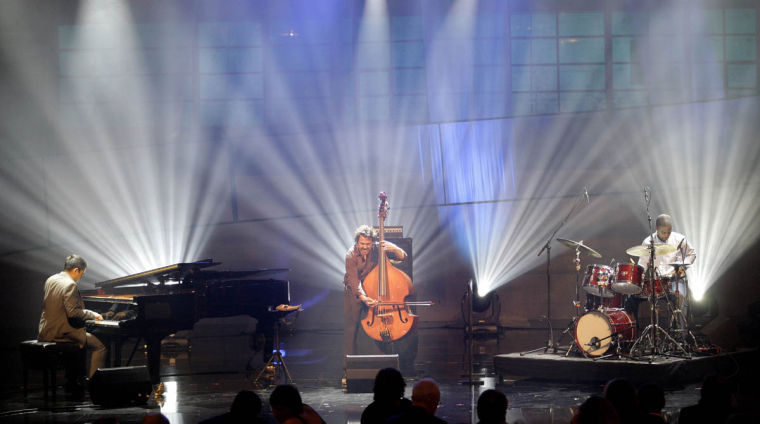Vijay Iyer to perform ‘cutting-edge’ jazz at Krannert
Feb 20, 2014
Living in New York City, teaching at Harvard University and performing around the world, Vijay Iyer pushes the boundaries of what seem possible in his work schedule — and with his jazz music — on a daily basis.
As a composer, producer, performer and musician, Iyer said that his music is a process of exploration and challenging himself to do what has not been done before.
“I started pushing myself to hear things that I don’t think I can hear or do yet,” he said. “Sometimes it’s about … creating some sort of opportunity to reach outside of myself or beyond myself.”
Larry Gray, associate professor in jazz studies, said that Iyer’s music is a “controversial kind of music because it is so forward-reaching.” He added, however, that these ventures have paid off.
The Vijay Iyer Trio’s jazz album “Historicity,” released in 2009, was nominated for a Grammy Award and named No. 1 Jazz Album in The New York Times, the Los Angeles Times and the Chicago Tribune, among other reviews. His next album, “Mutations,” is set to debut in March.
Get The Daily Illini in your inbox!
Vijay, who plays piano, along with Marcus Gilmore on drums and Stephan Crump on bass, will perform Thursday through Saturday at 7:30 p.m. at the Krannert Center for the Performing Arts.
For Iyer, the journey toward these successes began when he was just three years old and learned to play the violin. He said that this trained his ear and “let (him) live inside of music” throughout his childhood until college.
“I learned piano by accident, really. It just grew in a different way, in that the process was very improvisational and self-guided,” he explained. “I just started imitating things and making things on my own.”
Iyer said that during a brief period, he considered becoming a scientist. He earned degrees in mathematics and physics at Yale University before he entered the University of California–Berkeley. While continuing to play in ensembles there, his studies took a turn and he decided to focus on the science of music cognition.
“I liked music better, and I had a chance to pursue it to make it the center of my life, instead of something on the margins,” he said. “Opportunities opened up where I found myself on the international stage or collaborating with some of the best musicians in the world.”
Though Iyer paints a picture of himself simply stumbling into a career in jazz music, his music embodies a complexity only possible from someone with extraordinary talent and skill, said Gabe Solis, associate professor in jazz studies.
“He’s technically among most advanced musicians you can imagine,” Solis said. “You can just hear the pure skill honed over years; that’s remarkable.”
One of Iyer’s projects that exemplifies this “remarkable” skill and creativity was the 2013 album, “Holding It Down: The Veterans’ Dreams Project.” The album is a musical and poetic collaboration with poet Mike Ladd and Iraq and Afghanistan veterans of color. Largely electronic, the album expresses the dreams and realities that veterans have faced post-9/11.
“We were dealing with war indirectly at home, and (Mike Ladd and I) realized we’d been skirting around that reality and felt that the best step forward was to face it squarely and collaborate with veterans,” Iyer said. “For us it was really driven by the story telling and our belief that music needs to respond to that and support it.”
The result was an album that accomplishes a collaboration of electronic music, jazz and poetry, while addressing a relevant issue in an uncharted way — something that Iyer said is central to his efforts to balance jazz roots with artistic exploration.
“Even when we kind of push the envelope of format, we’re connected to a jazz community. Our points of reference are from that lineage,” he said.
Responding to the jazz community and the specific audience energy is exactly what Iyer said his trio will do during this weekend’s performance.
Gray agreed that as a musician, Iyer seems to be the type of performer who wants his audience to feel his music, so his concert could also feature more melody-driven pieces.
Iyer said that the trio’s performance is based on a pre-determined repertoire but that the group also adjusts and responds to the space and to the audience.
“It’s very intuitive based on the feeling in the room,” he said. “Is the audience starting to get restless? How do we keep them from throwing tomatoes at us?”
Solis said that given the energy in the Vijay Iyer Trio’s music, it is unlikely that there will be any tomato-throwing.
“There’s a level of intensity that audiences will probably really respond to,” Solis said. “It’s not always easy, though. His music repays those who pay close attention. You’ll notice things in it because it’s deeply layered; there’s a lot going on in it.”
Iyer also acknowledged that the trio’s music appeals to the trained jazz ear but that even those with no prior knowledge can draw something from their performance.
“Improvisation creates a lot of different rhythms, so that brings a lot of force and also delicacy and texture,” he described. “It’s very lyrical as well, so it’s something that anyone can enjoy and you don’t have to be an expert to still get something out of it.”
Maggie can be reached at [email protected].






